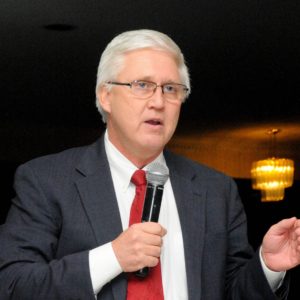Few people in New Hampshire politics had as much at risk in this year’s high-wire state budget process as Senate President Chuck Morse. And few people are more pleased with the results.
“I’m very happy with the budget,” Morse told NHJournal Thursday afternoon. “Sen. [Jeb] Bradley and I worked with our House counterparts and the governor to make sure we got our objectives passed. We said we’d lower taxes to help drive the economy — that was our first and foremost priority — and we did.”
Speculation is rampant that Morse is prepping for a possible governor’s race in 2022, should Gov. Chris Sununu choose to either challenge incumbent Democrat U.S. Senator Maggie Hassan or return to the private sector. Getting to a final budget could have been a fiasco, one that would have reflected poorly on Morse’s leadership skills.
Instead, Republicans put together a budget they believe will be a big win, both for businesses and for the GOP in 2o22.
“It may look like it happened at the last minute, but it didn’t. We’ve been working on this for months,” Morse said. “I honestly believe I earned my $125 this session.”
Morse said he is most proud of how the legislature “lived up to the promise of the Hinch amendment to continue to reduce business taxes,” a reference to popular Speaker of the House Dick Hinch, whose sudden COVID-19 related death last December shocked the legislature. Morse sees the tax cuts in this budget as a continuation of Hinch’s efforts.
“We sort of went off the rails in the last budget [on business tax rates], but we got back on track with this one.” The new Business Enterprise Tax rate would fall from 0.6 percent to 0.55 percent, and the Business Profits Tax rate is cut from 7.7 percent to 7.6 percent. It also raises the tax thresholds as well.
“When we started this, New Hampshire was ranked 47th [worst] in the nation for business taxes,” Morse noted.
Morse also pointed to the proposal to phase out the 5 percent tax on dividend and interest income as another big-budget success.
“Lowering the interest and dividends taxes sends a strong message to seniors, and over time it will help build our economy by keeping people here instead of moving to Florida,” Morse said.
On the contentious issue of reforming the governor’s powers to declare and extend emergencies without legislative approval — a year-long battle between Sununu and some libertarian-minded legislators that turned ugly at times — Morse believes the final compromise “is exactly what we were all striving for.”
“We’re going to have a system in New Hampshire where the legislature can ask the governor to explain why he wants to continue an emergency, and where the Senate has an equal vote with the House,” Morse said.
Under the final agreement, the House’s proposal forcing the governor to get an affirmative vote from the legislature to continue the state of emergency after 90 days was rejected. Instead, the governor’s order will only be halted if both chambers vote to end it. While the governor would be required to address the legislature, he would not need their permission to continue the state of emergency.
Asked if this shifts the constitutional balance from “the people’s house” to the executive, Morse disagreed.
“We made sure we protected the [state] constitution every step of the way,” Morse insisted.
Morse had little to say about the social issues in the budget, from the 24-week abortion limitation to the anti-discrimination language that would prevent government employees from advancing the tenets of Critical Race Theory. He instead returned the conversation again and again to taxes and the economy.
“When we started, I told everyone in the caucus that this budget fight is about leadership — leadership on reducing taxes to drive the economy, while New Hampshire lives within its means,” Morse said. “That’s what this budget does.
“And I believe, when people get into the details, they’re going to be surprised by how much money is going back to the taxpayers. We’ve got the room and meals tax [cuts], the education funding — we send $100 million directly for property tax relief. And on top of that, because of our economy, we had the revenue to put money aside for the future as well.”
On the family medical leave insurance included in the budget, Morse said it was a priority for the governor and he was happy to help — though there’s still work to be done.
“The fact is, we kept it in the private sector, not a new government agency. The governor believes it’s a model the entire country will look at and follow. Now it’s our job to put it into action.”
A policy that’s a model for the nation might be the priority of a governor who’s considering pursuing another office. By keeping it in the budget, Morse might be doing his part to encourage Sununu to run for the U.S. Senate. Would the Senate president make a move for the governor’s office?
Morse said the new budget is all about the economy, growth, and fiscal responsibility — a phrase, it might be noted, would look good on a ’22 campaign bumper sticker.
“We have made it very clear we are going to limit taxes while providing for the needs of the state of New Hampshire, and that’s exactly what this budget does,” Morse said.





